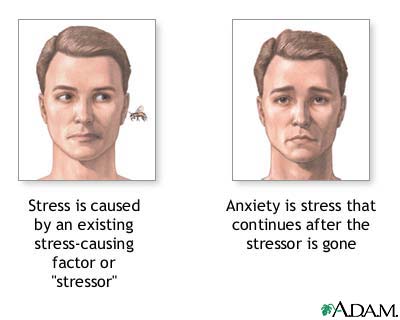Generalized anxiety disorder: MedlinePlus Medical Encyclopedia (original) (raw)
Generalized anxiety disorder (GAD) is a mental disorder in which a person is often worried or anxious about many things and finds it hard to control this anxiety.
The cause of GAD is unknown. Genes may play a role. Stress may also contribute to the development of GAD.

GAD is a common condition. Anyone can develop this disorder, even children. GAD occurs more often in women than in men.
The main symptom is frequent worry or tension for at least 6 months, even when there is little or no clear cause. Worries often seem to float from one problem to another. Problems may involve family, other relationships, work, school, money, and health.

Even when they are aware that worries or fears are stronger than appropriate for the situation, a person with GAD still has difficulty controlling them.
Other symptoms of GAD include:
- Problems concentrating
- Fatigue
- Irritability
- Problems falling or staying asleep, or sleep that is restless and unsatisfying
- Restlessness when awake
The person may also have other physical symptoms. These can include muscle tension, upset stomach, sweating, or difficulty breathing.
There is no test that can make a diagnosis of GAD. The diagnosis is based on your answers to questions about the symptoms of GAD. Your health care provider will ask about these symptoms. You will also be asked about other aspects of your mental and physical health. A physical exam or lab tests may be done to check for other conditions that cause similar symptoms.
The goal of treatment is to help you feel better and function well in daily life. Talk therapy or medicine alone can be helpful. Sometimes, a combination of these may work best.
TALK THERAPY
Many types of talk therapy may be helpful for GAD. One common and effective talk therapy is cognitive-behavioral therapy (CBT). CBT can help you understand the relationship between your thoughts, behaviors, and symptoms. Often CBT involves a set number of visits. During CBT you can learn how to:
- Understand and gain control of distorted views of stressors, such as other people's behavior or life events.
- Recognize and replace panic-causing thoughts to help you feel more in control.
- Manage stress and relax when symptoms occur.
- Avoid thinking that minor problems will develop into terrible ones.
Other types of talk therapy may also be helpful in managing symptoms of an anxiety disorder. Your provider can discuss talk therapy options with you. Then you can decide together if it is right for you.
MEDICINES
Certain medicines, often also used to treat depression, may be very helpful for this disorder. They work by preventing your symptoms or making them less severe. You must take these medicines every day. DO NOT stop taking them without talking with your provider. They include:
- Selective serotonin reuptake inhibitors (SSRIs), which are most often the first choice of antidepressants
- Serotonin-norepinephrine reuptake inhibitors (SNRIs), which are another choice
Other medicines such as hydroxyzine or medicines used to treat seizures, like gabapentin, may also be tried. These medicines act more quickly and may be taken as needed rather than regularly.
Medicines called sedatives or hypnotics may also be prescribed.
- These medicines should only be taken under a provider's direction.
- Your provider will prescribe a limited amount of these medicines. They should not to be used every day.
- They may be used when symptoms become very severe or when you are about to be exposed to something that always brings on your symptoms.
- If you are prescribed a sedative, do not drink alcohol while on this medicine.
SELF-CARE
Other than taking medicine and going to therapy, you can help yourself get better by:
- Reducing caffeine intake
- Not using street drugs or large amounts of alcohol
- Exercising, getting enough rest, and eating healthy foods
- Keeping a regular schedule and getting out of the house every day
You can ease the stress of having GAD by joining a support group. Sharing with others who have common experiences and problems can help you not feel alone. Support groups are usually not a good substitute for talk therapy or taking medicine, but can be a helpful addition.
- Anxiety and Depression Association of America -- adaa.org/supportgroups
- National Institute of Mental Health -- www.nimh.nih.gov/health/find-help
How well a person does depends on how severe the condition is. In some cases, GAD is long-term and is difficult to treat. Most people get better with medicine or talk therapy.
Depression and substance abuse may occur with an anxiety disorder.
Contact your provider if you frequently worry or feel anxious, especially if it interferes with your daily activities.
American Psychiatric Association. Anxiety disorders. Diagnostic and Statistical Manual of Mental Disorders. 5th ed. Text Revision (DSM-5-TR). Arlington, VA: American Psychiatric Publishing; 2022:chap 5.
Calkins AW, Bui E, Taylor CT, Pollack MH, LeBeau RT, Simon NM. Anxiety disorders. In: Stern TA, Fava M, Wilens TE, Rosenbaum JF, eds. Massachusetts General Hospital Comprehensive Clinical Psychiatry. 2nd ed. Philadelphia, PA: Elsevier; 2016:chap 32.
Lyness JM. Psychiatric disorders in medical practice. In: Goldman L, Schafer AI, eds. Goldman-Cecil Medicine. 26th ed. Philadelphia, PA: Elsevier; 2020:chap 369.
National Institute of Mental Health website. Anxiety disorders. www.nimh.nih.gov/health/topics/anxiety-disorders. Updated April 2023. Accessed June 7, 2023.
Updated by: Fred K. Berger, MD, addiction and forensic psychiatrist, Scripps Memorial Hospital, La Jolla, CA. Also reviewed by David C. Dugdale, MD, Medical Director, Brenda Conaway, Editorial Director, and the A.D.A.M. Editorial team.